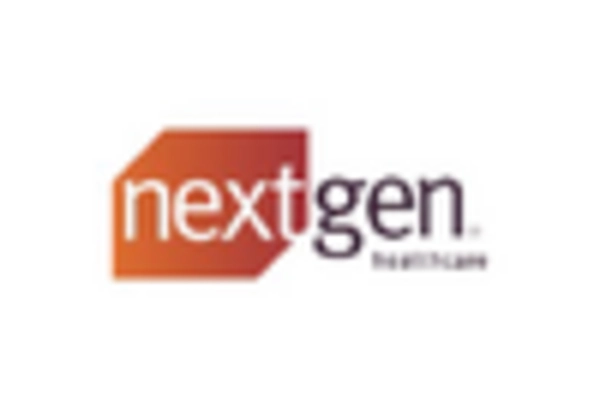Increased Focus on Data Analytics
In the Patient Referral Tracking System Market, the increasing focus on data analytics is reshaping how healthcare providers manage referrals. The ability to analyze referral patterns and outcomes allows organizations to identify bottlenecks and improve processes. Recent studies indicate that healthcare facilities utilizing data-driven referral systems can enhance their referral completion rates by up to 25%. This analytical approach not only aids in optimizing resource allocation but also supports strategic decision-making. As healthcare organizations recognize the value of data in improving patient care, investments in referral tracking systems that incorporate advanced analytics are likely to rise. This trend suggests a shift towards more informed, evidence-based practices within the Patient Referral Tracking System Market, ultimately leading to better patient experiences and outcomes.
Growing Emphasis on Patient Engagement
The Patient Referral Tracking System Market is witnessing a growing emphasis on patient engagement as a critical driver of referral management. Healthcare providers are increasingly recognizing that involving patients in their care journey can lead to improved adherence to referrals and better health outcomes. Engaging patients through digital platforms and communication tools enhances their understanding of the referral process, thereby reducing confusion and increasing satisfaction. Data shows that organizations that prioritize patient engagement in their referral processes experience a 20% increase in follow-through rates. This trend highlights the importance of patient-centered approaches in the Patient Referral Tracking System Market, as stakeholders seek to foster stronger relationships with patients and ensure they are active participants in their healthcare decisions.
Technological Advancements in Healthcare
Technological advancements are playing a pivotal role in shaping the Patient Referral Tracking System Market. Innovations such as artificial intelligence, machine learning, and telehealth are transforming how referrals are managed and tracked. These technologies enable healthcare providers to automate processes, reduce administrative burdens, and enhance communication between providers and patients. For instance, AI-driven systems can predict patient needs and streamline referral pathways, potentially increasing efficiency by 40%. As healthcare organizations continue to adopt these advanced technologies, the Patient Referral Tracking System Market is poised for substantial growth. This trend suggests that the integration of cutting-edge technology will not only improve operational efficiency but also enhance the overall patient experience.
Regulatory Pressures and Compliance Requirements
The Patient Referral Tracking System Market is significantly influenced by regulatory pressures and compliance requirements. As healthcare regulations evolve, organizations are compelled to adopt systems that ensure adherence to standards such as HIPAA and other data protection laws. Compliance not only mitigates legal risks but also enhances the credibility of healthcare providers. Recent reports indicate that non-compliance can lead to fines exceeding millions of dollars, prompting organizations to invest in robust referral tracking systems that facilitate compliance. This trend underscores the necessity for healthcare providers to integrate compliance features into their referral management processes. Consequently, the Patient Referral Tracking System Market is likely to see increased demand for solutions that not only streamline referrals but also ensure regulatory adherence.
Rising Demand for Efficient Healthcare Solutions
The Patient Referral Tracking System Market is experiencing a notable surge in demand for efficient healthcare solutions. As healthcare providers strive to enhance patient outcomes and streamline operations, the need for effective referral management systems becomes increasingly apparent. According to recent data, healthcare organizations that implement referral tracking systems report a 30% reduction in referral leakage, which directly impacts patient satisfaction and care continuity. This trend indicates a growing recognition of the importance of coordinated care, driving investments in referral tracking technologies. Furthermore, as healthcare systems evolve, the integration of these systems into existing workflows is seen as essential for improving operational efficiency. The Patient Referral Tracking System Market is thus positioned to benefit from this rising demand, as stakeholders seek to optimize patient journeys and ensure timely access to necessary services.















